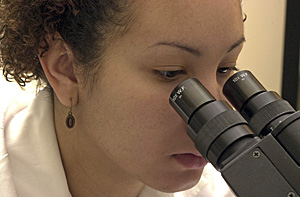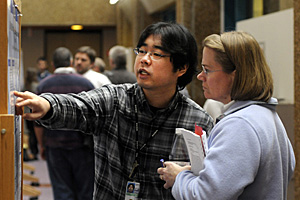Postdoctoral Training Opportunities at the National Toxicology Program
How would you like the opportunity to train and be part of the world’s most prestigious toxicology program?

The National Toxicology Program (NTP) offers a limited number of postdoctoral training fellowships that prepare scientists for careers in pharmaceutical and chemical industries, regulatory agencies, and academia.
The NTP is the nation’s premier federal program for testing and evaluating agents of public health concern in our environment. The NTP develops and applies tools of modern toxicology and molecular biology to evaluate substances that may potentially cause harm to human health.
The NTP is headquartered at the National Institute of Environmental Health Sciences (NIEHS), part of the National Institutes of Health. NIEHS is located on a beautiful campus in Research Triangle Park, North Carolina.
Eligibility
Applicants must hold a Ph.D. or equivalent in toxicology or an allied science, M.D., D.V.M., or other equivalent professional degree.
Visa assistance is available for qualified international applicants.
Stipend and Benefits
The postdoctoral training program funds fellowships for up to five years. Stipends are determined by the amount of previous postdoctoral experience. Medical insurance is provided.
To Apply
The number of NTP fellowships is very limited and competitive. There is no specific deadline for applying.
To check availability of a fellowship in the field of your choice, send a cover letter, curriculum vitae, and the names and contact information of three persons as references to:
-

-
Rajendra S. Chhabra, BVSc., Ph.D., D.A.B.T. (http://www.niehs.nih.gov/research/atniehs/dntp/assoc/staff/chhabra/index.cfm)
Postdoctoral Training Program Coordinator, Contractor -
Tel (919) 541-3386
Fax (919) 541-3647
chhabrar@niehs.nih.gov -
P.O. Box 12233
Mail Drop K2-13
Research Triangle Park, North Carolina 27709
Delivery Instructions
Applied Toxicology and Carcinogenesis

These are non-laboratory based research fellowships in the Toxicology Branch. The trainees would actively participate in the design, conduct, and evaluation of studies on diverse classes of chemicals and have extensive interaction with staff from scientific disciplines such as chemistry, pathology, toxicokinetics, toxicogenomics, genetics, epidemiology, statistics, and molecular biology.
Trainees may choose in-depth study in one subspecialty area of particular interest, and it is envisioned that trainees would author reports in the NTP Technical Report (http://ntp.niehs.nih.gov/index.cfm?objectid=084801F0-F43F-7B74-0BE549908B5E5C1C) series and manuscripts for peer-reviewed publications.
Trainees will learn to perform all aspects of contracted toxicology studies for carcinogenic or non-carcinogenic endpoints (e.g., reproductive and developmental effects, immune system function).
They will also learn about National Toxicology Program (NTP) efforts in molecular toxicology and high throughput screening. They will receive training applicable to regulatory or industrial toxicology.
Biomolecular Screening and Computational Toxicology
These fellowships are housed in the Biomolecular Screening Branch and structured to train individuals in:
- Developing research and testing activities in medium- and high-throughput/content screening assays for the rapid detection of biological activities of significance to toxicology
- Developing and conducting automated screening assays with Caenorhabditis elegans that inform on biological activities of significance to toxicology
- Developing assays and approaches to understand the genetic and epigenetic bases for differences in susceptibility
- Developing computational tools and approaches to allow for an integrated assessment of data generated using these screening approaches with findings from traditional toxicology models and human studies
Health Assessment and Translation

These fellowships are designed to provide trainees experience in the assessment, integration, interpretation, and communication of scientific information on environmental agents. The fellowship will be within the Division director's office. Trainees will gain experience in:
- Conducting in-depth, systematic evaluations of laboratory and clinical data, integrating relevant information for reaching conclusions, and managing peer review
- Carrying out workshops or state of the science evaluations to address important environmental health issues
- Interpreting and communicating toxicology information useful for public health policy
Laboratory Animal Medicine
The fellowship in Laboratory Animal Medicine is within the Cellular and Molecular Pathology Branch and is designed for individuals to participate in National Toxicology Program (NTP) and National Institute of Environmental Health Sciences (NIEHS) laboratory animal veterinary care. This includes clinical and surgical responsibilities, animal care facility management, participation in research projects, and laboratory animal pathology.
The trainee will participate in didactic training and hold clinical duty at nearby academic institutions.
The trainee will also be responsible for conducting and publishing research as first author a peer-reviewed journal.
These experiences will lead to preparation for the American College of Laboratory Animal Medicine (ACLAM) board exam. The program offers laboratory animal medicine expertise among board certified ACLAM veterinarians located in Research Triangle Park (RTP), NC.
Trainees will have opportunities to attend outside training activities and scientific meetings, as well as engaging collaborative research with scientists at NIEHS.
Systems and Mechanistic Toxicology

The National Toxicology Program Laboratory offers a wide range of training opportunities, which focuses on helping to develop advanced approaches to collect/interpret data generated from in vivo and in vitro experiments.
Trainees could potentially be provided with:
- Opportunities to learn RNA, DNA and protein assessment techniques
- Advanced training in cell culture and co-culturing techniques
- Immunohistochemical and immunoflourescence staining techniques for detection of nuclear, cytoplasmic and membrane cell signaling proteins in rodent and human tissues
- Training in light and confocal microscopy, ScanScope digital image acquisition, and basic toxicologic and molecular pathology.
- Training in inorganic toxicology, stem cells methods and research, and chemical carcinogenesis research, as well as endocrine and neurotoxicology techniques.
Toxicological Pathology
The fellowship in Toxicological Pathology is within the Cellular and Molecular Pathology Branch (CMPB) and is designed for individuals to participate in National Toxicology Program (NTP) and National Institute of Environmental Health Sciences (NIEHS) research projects, work to achieve accuracy of NTP pathology data, learn rodent pathology, and continue education toward achievement of board certification by the American College of Veterinary Pathologists (ACVP) (Clinical or Anatomic Pathology).
Two years of veterinary pathology residency training is required.
The research performed can be thesis work toward the achievement of a Ph.D. degree by arrangement with various universities. With a world-renowned reputation for practicing toxicological pathology, the program offers rodent pathology expertise in multiple areas including cardiac, pulmonary, renal, reproductive, and immune system toxicology.
Fellows will work with NTP study pathologists to gain experience in rodent toxicology studies.
The training program features access to experienced and ACVP-certified staff members, outstanding training resources for the ACVP exam, and an excellent ACVP exam pass rate.
There are opportunities to attend outside training activities and scientific meetings, as well as engaging in collaborative research with intramural NTP and NIEHS scientists.

